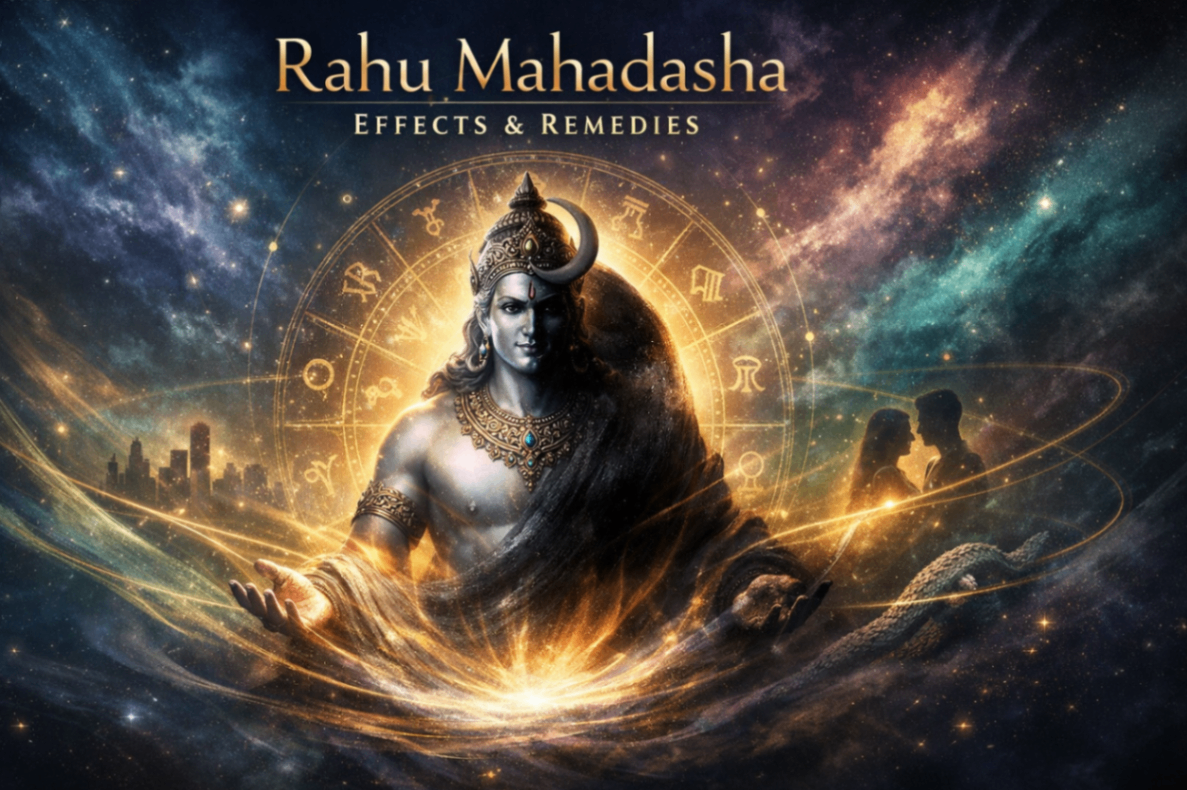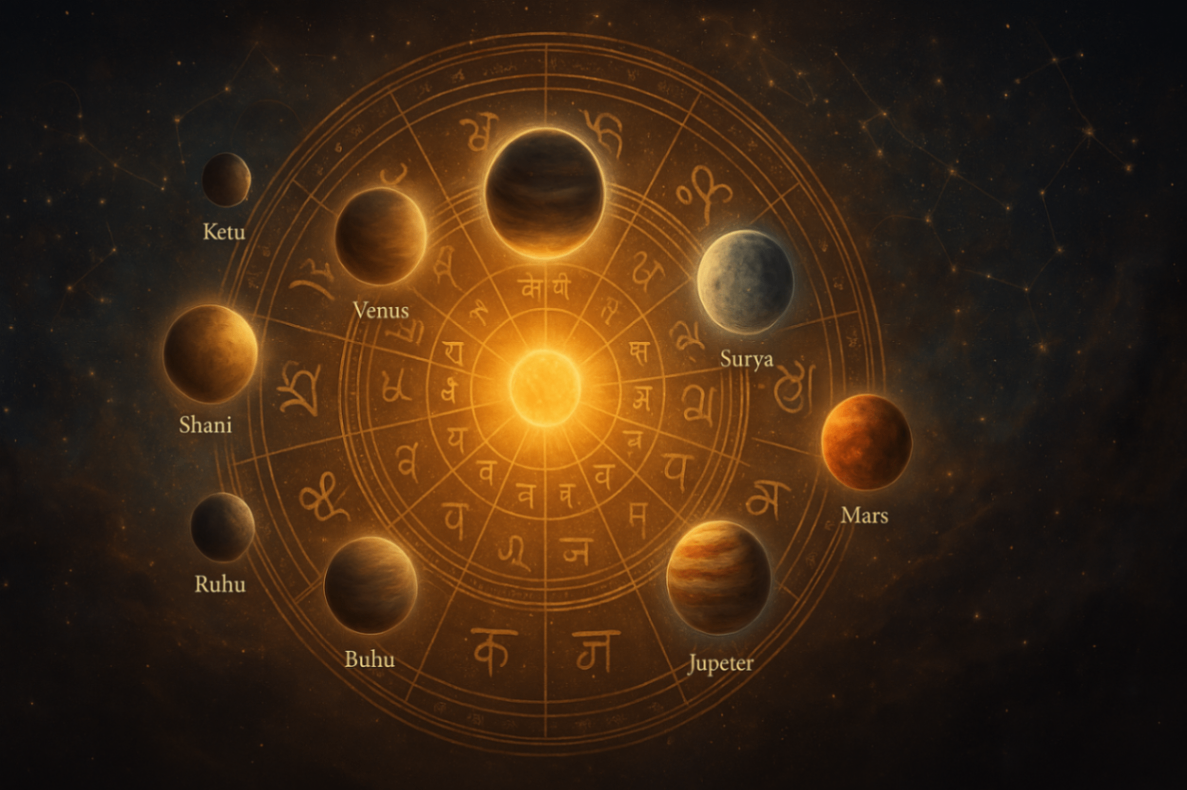Effect of Dashas
Understanding profound subjects like astrology is not so simple. The pioneers of astrology have documented it in such a way that it assigns appropriate significance to planets, signs, houses, yogas, nakshatras, and dashas and shows their complementarity to each other.This article will attempt to explain what a dasha is, how it affects an individual, and what results are obtained during its tenure, including the fruits of its enjoyment. In astrology, it is the dasha system that helps in determining the timing of results based on the position of planets.
Human life constantly undergoes changes, and events continue to occur one after the other. Knowledge of the fruition of karmas forming in the birth chart through dasha is based on the sequence of dashas. In simple words, dasha means the period of experiencing the results, during which a planet (dasha lord) controls life and gives results according to its qualities – auspicious, mixed, or inauspicious.
Sage Parashara has described approximately 54 and Sage Jaimini has described 44 specific dashas for the specific results related to planetary qualities (PAC), such as Dvisaptati, Chaturshiti, Dwadashottari, Shashthiyanee, Shodashottari, Chara, Sthira, Mandook, and Yogini, among others.
However, the straightforward, popular, accurate, and universally accepted Vimshottari dasha system is the one that calculates the planetary periods based on the position of the Moon. In todays astrology, the lifespan of a human is considered to be 120 years based on this system.
Predictions made using this method are generally considered accurate, and astrologers have been using it extensively to interpret results. All astrological texts mention the effects of planetary dashas on various aspects of life, such as happiness, joy, prosperity, intensity, speed, enthusiasm, family, behavior, health, age, wealth, profession, and past lives, among others.
The planetary results during a dasha are also influenced by transits. When analyzing the impact of dasha, one should consider the position of the dasha lord concerning the Ascendant, Moon sign, and Moon, as well as the aspects and conjunctions. If the dasha lord is in the first, fifth, or ninth house from the Ascendant, it gives favorable results in accordance with its nature. Thus, a planet placed well in the birth chart provides positive results during its mahadasha.
According to Brihat Parashara Hora Shastra, the impact of a planets mahadasha varies throughout its duration. The fruit of the mahadasha is determined by the planets strength, conjunctions, and aspects, and it depends on its natural and immediate effects. In the beginning of the mahadasha, the dasha lord gives results as per the house lordship, in the middle as per the sign, and in the end as per the planets in association with it.
In other branches of astrology, multiple rules have been mentioned to interpret the results of planetary mahadasha. In this context, the effects of the mahadasha lord, whether auspicious or inauspicious, are also assessed based on the first house or Ascendant, such as how a planet yields different results in various Ascendants.
The interpretation of dasha results in predictive astrology is dependent on the strength and yoga formations of planets. It is essential to consider the position of planets in different signs and houses while determining the results of a dasha. Each planet gives different results in different signs and houses based on its natural qualities.
The major planets mahadasha is further divided into sub-dashas, which are distributed in a proportionate sequence. For example, if the mahadasha is considered as years, the antardasha becomes months, and the pratyantardasha becomes days.
To bring subtlety to the predictions, the subdivision of dashas is crucial and beneficial. Since one cannot experience the entire mahadasha in the same way, this subdivision helps in detailing the fruits of different phases.
In conclusion, the dasha system is considered the ultimate method for predicting results, and it allocates results differently during its entire duration. The major dasha lord in its mahadasha, antardasha, and pratyantardasha periods gives results based on specific circumstances, and the behavior of the planet aligns with its inherent nature.
Any Mahadasha retains its influence for a minimum of 3 years and 3 months or more. It is beneficial to predict results for every 6 months. A Mahadasha does not always yield the same results throughout its duration; the results may vary based on the Antardasha, Pratyantardasha, and planetary positions.
These sub-periods provide detailed insights into the effects of each Mahadasha, offering clear indications of when and for how long specific events will occur. If all conditions are favorable, the native experiences highly auspicious outcomes. For example, if a natives first Mahadasha is ruled by Ketu, the first Antardasha will also be ruled by Ketu, and the subsequent Antardashas will follow the sequence of Venus, Sun, and Moon based on the day and duration.
Regardless of the Mahadasha, it never yields the same results throughout its entire duration. Generally, the dashas of the 1st, 4th, 7th, 10th, 5th, and 9th houses are considered auspicious and favorable. If the ruling planet of the Mahadasha is auspicious, it will provide generally favorable results throughout its duration.
The 3rd and 11th houses also yield favorable results when weak malefic planets are present in their respective Mahadashas. In such cases, the results are moderately positive throughout the Mahadasha.
As mentioned, the Vimshottari Dasha system is being used here, and it calculates the Mahadasha duration based on the Moons position, including the role of nakshatras. Planets move through four quarters of a nakshatra in their journey of 30 degrees. The Vimshottari Mahadasha divides the total duration of each planets Mahadasha into 120 years, proportionally distributed according to their individual durations.
In nakshatra calculations, the first point is Ashwini, and the count goes up to Revati, divided into four quarters. Planets are assigned positions in the order of Sun, Moon, Mars, Mercury, Jupiter, Venus, and Saturn, while in the Vimshottari Dasha sequence, the order is Ketu, Venus, Sun, Moon, Mars, and so on.
With Ketu ruling Ashwini nakshatra, the Mahadasha sequence starts with Ketu and spans a total of 120 years, distributed as follows:
- Ketu: 7 years
- Venus: 20 years
- Sun: 6 years
- Moon: 10 years
- Mars: 7 years
- Rahu: 18 years
- Jupiter: 16 years
- Saturn: 19 years
- Mercury: 16 years
When analyzing Mahadasha, Antardasha, and Pratyantardasha results, its essential to consider the relationship between the ruling planet and other planets, as well as their natural friendship, enmity, and immediate proximity, as they significantly impact the natives life.
Generally, strong and exalted planets yield positive results in their Mahadashas, while weak and debilitated planets may produce adverse effects. This analysis provides insights into the various planetary influences during the natives life.
Below is the discussion on the impact of various planetary positions (Graha Dasha) on a persons life. It provides insights into how different planetary positions can affect different aspects of a persons life. Heres a rough translation:
**Weak Jupiter (Guru) - 16 years:**
Weak Jupiter can cause obstacles in education, failures, poverty, obesity, diabetes, and digestive problems. It may also bring disgrace to women and difficulties in offspring matters. Challenging tasks may be encountered in old age.
**Strong Venus (Shukra) - 20 years:**
A strong Venus brings growth in women, children, wealth, arts, fashion, music, education, physical pleasures, marriage, love affairs, cinema, benefits from women, clothing, jewelry, vehicles, agriculture, and fosters mutual trust and harmonious relationships.
**Weak Venus (Shukra) - 20 years:**
A weak Venus can lead to urinary problems, hernia, reduced sexual abilities, poor social behavior, discord with wives or women, financial losses, and excessive fear.
**Favorable Saturn (Shani) - 19 years:**
During a favorable Saturn period, one may benefit from public-related work, wealth from land and property, devotion to God, ancestral property, and profit from jobs and businesses.
**Unfavorable Saturn (Shani) - 19 years:**
An unfavorable Saturn period can bring poor health, poverty, legal troubles, imprisonment, theft, misfortunes, unhappy life, difficulties abroad, financial loss, and false accusations.
**Rahu - 18 years:**
A favorable Rahu period can bring benefits related to royalty, ministership, politics, espionage, foreign affairs, shares, betting, marriage, employment, and luck. It may also be beneficial for trade in medicines, oil, and gas, and it can lead to gains abroad.
**Unfavorable Rahu - 18 years:**
During an unfavorable Rahu period, there may be delusions, confusion, fear of poison, mental distress, poor diet, urinary problems, family deaths, obstacles in progress, and the adoption of bad habits like alcohol and non-vegetarianism.
**Ketu - 7 years:**
A favorable Ketu period can lead to interest in spirituality, religion, philosophy, worship, and knowledge. It may also bring gains from authoritative figures and liberation.
**Unfavorable Ketu - 7 years:**
An unfavorable Ketu period can lead to foreign residence, separation from wife, children, father, and Guru. It may also bring fear of diseases like chickenpox, injuries, hemorrhoids, accidents, and losses from friends, partners, or the government.
The text also emphasizes the importance of both the planetary positions and the transits (Gochar) of planets, as they together influence a persons life events. The timing of these events is crucial, and the accurate prediction of outcomes depends on various factors, including the positions of planets in ones birth chart (Kundali).




























